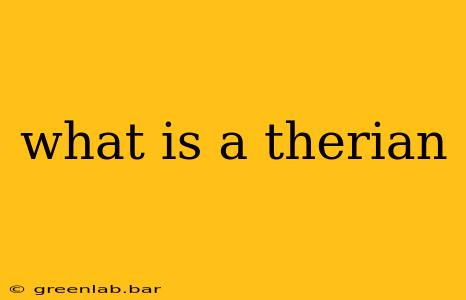Therianthropy is a complex and often misunderstood phenomenon. Simply put, a therian is a person who identifies as a non-human animal, spiritually or emotionally. This isn't about dressing up as an animal or simply having a favorite animal; it's a deeply ingrained part of their identity. Understanding therianthropy requires sensitivity and respect, as it's a significant aspect of many individuals' lives.
Delving Deeper into Therianthropic Identity
Therianthropy isn't a mental illness or disorder recognized by mainstream medical communities. It falls outside the typical diagnostic criteria and isn't currently studied extensively within a clinical context. However, that doesn't diminish its impact on those who identify as therian. For them, it's a core element of self-understanding.
The experience of being a therian is highly personal and diverse. There's no single, universally accepted definition. However, common themes include:
- Strong identification with a specific animal: This isn't just a preference; it's a profound sense of kinship and connection. This might involve feeling a deep understanding of the animal's behaviors, instincts, and even physical sensations.
- Spiritual or emotional connection: Many therians describe a spiritual or emotional link to their animal self, often feeling a sense of belonging or purpose.
- Physical sensations: Some therians report experiencing physical sensations associated with their animal form, such as changes in posture, muscle tension, or even a sense of increased senses.
- Varying degrees of intensity: The intensity of the therian experience varies widely from person to person. Some feel a strong and constant connection, while others may experience it more intermittently.
Common Misconceptions about Therianthropy
It's crucial to address common misconceptions surrounding therianthropy:
- It's not a mental illness: As previously mentioned, it's not currently considered a diagnosable mental health condition. Labeling it as such is harmful and invalidates the experiences of those who identify as therian.
- It's not roleplaying: While some therians may engage in roleplaying activities to explore their identity, therianthropy itself is not merely a form of fantasy or playacting. It's a deeply personal and meaningful aspect of self-discovery.
- It's not a lifestyle choice: It's not something that can be chosen or discarded at will. It's a core element of self-perception for many individuals.
The Therian Community and Support
There is a vibrant online community of therians who provide support, understanding, and resources to one another. This community offers a safe space for individuals to explore their identity, share experiences, and find acceptance. Within this community, various types of therianthropy are acknowledged and celebrated.
Conclusion: Respecting the Therian Experience
Understanding therianthropy requires empathy and a willingness to learn. It's a complex and deeply personal experience that deserves respect and understanding, free from judgment or misrepresentation. Instead of labeling or dismissing it, let's embrace a culture of acceptance and support for those who identify as therian. Further research and open dialogue are crucial in improving the understanding and acceptance of therianthropy within wider society.

